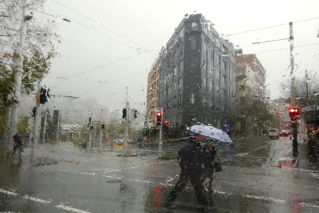‘Third wave’: Researchers raise alarm about coronavirus link to Parkinson’s disease

Most people infected with the coronavirus suffer a total or partial loss of smell, and the oddity has concerned researchers who believe it may become a factor in the onset of Parkinson’s disease.
The reduced ability to smell is just one of several neurological symptoms that suggest the coronavirus is affecting the brain.
But it was this loss that triggered researchers at the Florey Institute to review the possible health impacts of COVID-19 after recovery.
About 90 per cent of Australians with Parkinson’s disease can’t smell, and three out of four infectees reported the same experience to a varying degree, said Leah Beauchamp, the lead author of the review.
Having put two and two together, Ms Beauchamp said the coronavirus may be making its way to a region of the brain called the olfactory bulb, which processes information about odours.
She said the bulb contains neurons that project directly into the nostrils, making them particularly susceptible to environmental factors, such as viruses.
This is where researchers see acute inflammation of what’s called the epithelial cells in people with COVID-19.

Inflamed epithelial cells could be helping coronavirus make its way to the olfactory bulb in the brain. Graphic: Getty
These neurons aren’t protected by the blood-brain barrier that prevents viruses and other harmful toxins from entering the brain, thereby contributing to the loss of smell.
This is one of the main routes for viruses to be transported into the brain, where they can cause damage, Ms Beauchamp said.
It’s suspected almost everybody with COVID who experienced a loss of smell had their epithelial cells inflamed, she said.
This suggests the virus can get into the neurons contained within the olfactory bulb at the front of the brain, Ms Beauchamp said.
“It’s not saying that all of those people are going to go on to get Parkinson’s disease,” she said.
“It just means that those people probably have one more factor in their life that is a risk factor for Parkinson’s disease.”
The review, published in the Journal of Parkinson’s Disease, says there needs to be long-term monitoring of people who have recovered from COVID-19 to more deeply understand the neurological consequences that may arise in those who have been infected with the coronavirus.
It warned about the need for healthcare systems around the world to be prepared for “a third wave of the virus in the form of parkinsonism”.
A recent report published in The Lancet revealed a 45-year-old man in Israel taken to hospital with the coronavirus was later diagnosed with probable Parkinson’s disease.
The man noticed a loss in his sense of smell a few days before being admitted.
He was isolated for three weeks during which time his handwriting became smaller and less readable, he had difficulties speaking and typing text messages, and his right hand started shaking.

Prince Charles reported a loss of smell after suffering from the coronavirus. Photo: Getty
This continued when he went home.
After being admitted to the Department of Neurology at Shaare Zedek Medical Centre in Jerusalem, the man reported that a tremor was affecting both his legs.
Co-author of the new literature review, Professor David Finkelstein said “there’s strong suspicion” neurological problems such as Parkinson’s may arise in people who have been infected with COVID-19.
The head of the Parkinson’s Disease Laboratory at the Florey Institute, Professor Finkelstein said it was “clear” the coronavirus could make its way to the brain.
He warned young people who were lax about COVID-19 that if they became infected, there’s a possibility it could cause damage and “you could pay for that years afterward”.
“There is a very strong literature that COVID gets into the brain in almost every case,” Professor Finkelstein said.
“The question of viruses causing Parkinson’s has been in the literature since after the Spanish Flu in the 1920s.”








